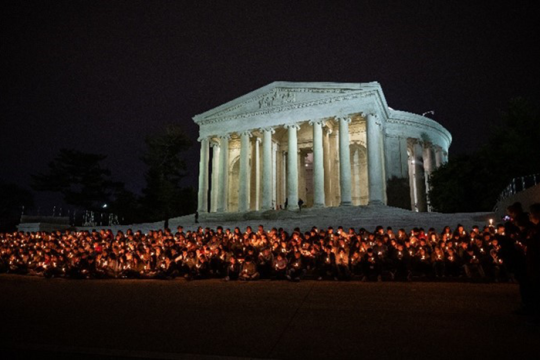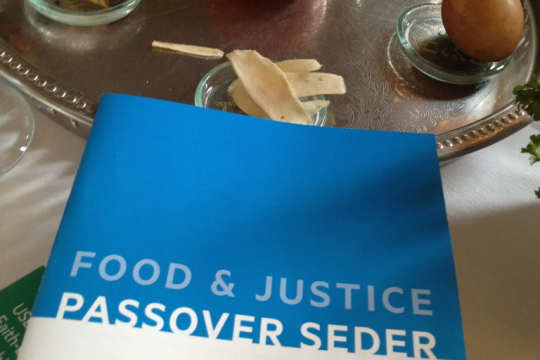
This post is adapted from a sermon given at Temple Sinai in Washington, DC on Friday, June 29, 2018.
Sometimes life imitates art, and I have learned that sometimes events imitate the Torah portion. Our Torah portion this week, Balak, begins noting the fear of King Balak of Moab in seeing the Israelites amassed at his border. In just three sentences, the biblical author sets the stage for the story:
“Balak…saw all that Israel had done to the Amorites. Moab was alarmed because that people was so numerous. Moab dreaded the Israelites, and Moab said to the elders of Midian, ‘Now this horde will lick clean all that is about us as an ox licks up the grass of the field.’” (Numbers 22:2-4)
The king of Moab was terrified, we read. Surely he led his people into terror at the invading Israelites that stood at their borders—600,000, according to the biblical account. How to respond? He did not build a wall, separate families, take the children hostage, or send them all back into the desert.
Instead, Balak sought the help of Balaam, a famous prophet/sorcerer for hire, to put a curse on the Israelites. Balak sent word to Balaam, “Come put a curse upon this people for me, since they are too numerous for me. Perhaps I can thus defeat them and drive them out of the land. For I know that the one whom you bless is blessed indeed and the one whom you curse is cursed.” (Numbers 22:6)
Today our nation is plagued by a different curse. Our national government promotes separating families as a way of controlling refugees. Indeed the Attorney General stated, “If you cross the border unlawfully ... then we will prosecute you. If you smuggle an illegal alien across the border, then we'll prosecute you. ... If you're smuggling a child, then we're going to prosecute you, and that child will be separated from you, probably, as required by law."
The Attorney General also cited Romans 13 to justify the zero tolerance policy. That verse in the New Testament instructs every person to be subject “to the governing authorities, for there is not authority except from God…” (Romans 13:1) This is a fine text to support the divine right of kings, or dictators, but our nation was founded on the principle that the authority to govern flows from the people, not from God. That verse has been used by British loyalists to discourage support of the Revolution in the 1700s and by Southern supporters of slavery in the 1800s. Using the text this way is a perversion–bad theology pretending that we are living under Roman rule.
Our nation today is plagued by many curses: the curse of racism emanating from the White House, promoting fear of brown people who are called “murderers and rapists,” and only last week we heard that there are not thousands, but “millions” of them seeking to “infest” and invade our country—reminders of the fear that Balak felt and used to scare his people.
Our nation today is plagued by the curse of callous disregard for the plight of refugees, for taking children to punish their families, for attempting to instill fear in our land.
The centerpiece of our foreign policy today is “America First,” a phrase borrowed from a movement in the late 1930s and early 1940s to fight American involvement in World War II. It was a movement that claimed 800,000 followers, with Charles Lindbergh as its spokesman. Its isolationism kept America out of World War II for three years, undoubtedly resulting in the death of millions of Jews in Europe, at the same time that our State Department closed our borders to refugees and placed great barriers to immigration to the United States. Those were cursed days for America, because of its betrayal of the core human values that had been central to our nation. And today we find the curses of isolationism and nativism confronting us again.
This year I am marking the 50th anniversary of my college graduation, and I am looking back to 1968. 50 years ago this month I gave the student sermon at the Baccalaureate Service at the University of California, Berkeley. It was a tumultuous time then. The Free Speech Movement began in the fall of my freshman year, 1964, and Berkeley remained a center of student activism, particularly focused on opposing the Vietnam war, as well as campus and University governance and educational reform. That spring of 1968 saw the killing of Martin Luther King and the widespread riots that followed. President Johnson announced that he would not seek another term. And only the week before we graduated, we mourned the assassination of Robert Kennedy. We were all focused on Chicago, where the Democratic convention would be a forum for the many issues that confronted our nation.
In my sermon I focused on the times and the values my generation sought. I said:
“There are today few things which our class—our generation—knows for sure, is committed to, and it seems that each of these has led to frustration, cynicism, and a realization of the sense of the absurd. We know that war is bad, and that peace is good, and the war across the sea is killing, maiming, and burning an innocent people who do not care about containment. We know we cannot support this war with our bodies, for it is not in our hearts. And we seek ways to say this. In Oakland and on Sproul Steps, in the voting booth and to our friends, to our draft board or our family, and it seems that all is to no avail. The questions are real and palpable and as close as September. And the decision to choose between jail or Canada or falsifying a record is bewildering and perhaps without comfort.
“We know that the American society is sick—or at least gravely ailing—and that something must be done to cure it. We see the shallowness of suburbia, the pettiness and self-centeredness of American business, the hopelessness of government work, and we wonder where we’ll go, what we’ll do…
“We know that the Black man must have freedom and fair opportunity to have what he has long had coming in America. We feel that something must be done urgently, and we tutor in Oakland, we picket, we press for demands of fair housing, education, hiring, creation of jobs, and we see the ghetto smoldering before our disbelieving eyes; we try to empathize for we can sense a shared and common frustration. And yet we labor to let the black man have his just share of [our] sick society. We want him liberated so he can gain entrance to that same way of life we are fleeing. We can sense the absurdity….
“We are products of affluence, and we no longer sense the need for material fulfillment. Those over thirty have given us the world on a silver platter: Free from want—except the poor, with whom we identify; free from disease—except the mental imbalance we see constantly and the festering sores of our society; free from fear—except in our cities, except from ourselves.”
Today there are different issues, but it is striking to me how many of the issues are still with us: the place of black people—and brown people—in our society, the need for adequate housing; the decades-long cycle of poverty that seems nearly impossible to break; sufficient food; equality in educational opportunities; the profound frustration in so many quarters. And we are unable to stop the plague of senseless shootings and to provide mental health support to so many who need it, as we saw yet again yesterday in Annapolis.
We are not yet at war today, but the White House is picking fights: trade wars, withdrawing from a treaty to prevent nuclear proliferation in Iran, withdrawing from trade partnerships and from a treaty to preserve our planet. And there is a war on the judiciary and constitutional guarantees that our judges at every level are sworn to protect—and we know that the next battle in this war is for the Supreme Court vacancy. The President justifies these actions with the misguided slogan “Make America Great Again”—a slogan that encourages Americans to look out only for ourselves, without regard for other countries, other people, or the future role of America as a leader for good in the world.
Today our task is to resist these initiatives, but it is more than that, as well. We need to proclaim our values and tell one another what we stand for as Americans, as Jews, as members of the religious community.
As Jews we believe that all people are created in God’s image. We reject any suggestion that denigrates brown people or black people as inferior. We know that racism is abhorrent, just as religious prejudice is a blight on our nation.
As Jews we are committed to welcome the stranger, understanding her plight and his struggle, because we were strangers in Egypt. For most of our families, it is but a generation or two ago that our forebears sought refuge in this nation from pogrom or poverty, so we understand the hearts of the strangers and the moral imperative to protect them.
As Jews we look to our children for hope in the future. We cherish the bonds that unite our families and are sustained by transmitting our heritage and our values to the generations that follow us. It is repugnant to separate parents from children as a tool to enforce any law.
As Jews we believe in the inherent dignity of all people. We believe that it is morally wrong to humiliate others and to label people as potential criminals because of the color of their skin or the language they speak.
As Jews we believe that it is especially abhorrent to demean others when they seek refuge from violence or famine, when they have fled for their lives seeking safety in our land.
These attitudes and these actions are curses upon our land and our nation. They betray core American values of welcoming “the tired, the poor, the huddled masses yearning to breathe free,” in the words of Emma Lazarus inscribed on the Statue of Liberty. As Jews and as Americans, we are profoundly committed to protecting and welcoming the refugee and the immigrant. Subverting these core values is a curse upon our society.
Hopefully you remember the conclusion of the story of King Balak and the sorcerer Balaam. Brought to Moab to curse the Israelites, he blesses them instead. King Balak is furious, but Balaam tells him that he can only speak the words that God puts in his mouth. King Balak takes him up to an overlook, so he can see the Israelites camped below, the source of fear for the Moabites. But Balaam, seeing the encampment, says “Mah Tovu ohalecha Yaakov, mishkenotecha Yisrael. How fair are your tents, O Jacob, your dwellings, O Israel!” words that are often still inscribed over the doors of synagogues, words that begin our morning prayers.
How can we turn curses into blessings? It takes courage and determination. It takes strength and the will to stand for our values. Sometimes it takes the right moment, and that moment is now. In 1964, as hundreds of students were being arrested on the Berkeley campus, at 17, I watched from the sidelines and heard people say, “If you are arrested, you will never get a job.” They were wrong, of course, and today, I am so proud of my colleagues and members who have been arrested this year, engaging in civil disobedience. I am proud that the moment has arrived for so many of us, that Temple Sinai has found its voice to speak out and act out for our beliefs and our values. We can—and we must—continue to seize that moment now. Through our determination and commitment we can turn the curses of our current leaders into the blessings of welcoming the stranger, insuring dignity for all, believing in the sanctity of families, creating a society of opportunity, a place of hope for all to flourish.
Fred N. Reiner is the Rabbi Emeritus at Temple Sinai, where he served as senior rabbi from 1985 to 2010. Rabbi Reiner also served as president of the Washington Board of Rabbis (2000-02) and as president of the Mid-Atlantic Region of the Central Conference of American Rabbis (CCAR). He served on the Board of Trustees of the national CCAR and on the Washington Advisory Council of Avodah. He has served on the faculty of the Howard University Divinity School under the sponsorship of the Jewish Chautauqua Society.
Related Posts

Why is this Right Different?: City of Grants Pass, Oregon v. Johnson and the Passover Call to Action

Highlights from the 2023-2024 L'Taken Season
